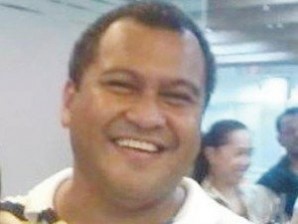
MANUEL AMALILIO: Suspected mastermind disappears. CONTRIBUTED PHOTO
MANILA, Philippines—Before Aman Futures, there was the Jachob “Coco”’ Rasuman group in Marawi City which, according to the National Bureau of Investigation, got even more money from its investors before it was shut down.
Virgilio Mendez, NBI deputy director for regional services, noted however that Rasuman’s group, which was founded in 2010, had a much smaller number of victims compared with Aman Futures, headed by Manuel Amalilio.
“We cannot at this time commit to an exact figure but our estimate based on the investigation is that the Rasuman group got more money and had fewer victims compared with the Aman Futures,” Mendez said.
Rasuman got more from its investors, Mendez said, noting as an example that Rasuman received P300 million from a group of only 29 investors in Cagayan de Oro.
“The investors of Rasuman were moneyed people, while those of Aman Ventures were ordinary people,’’ he added.
Mendez said Rasuman and Aman Amalilio had no personal relationship although Rasuman also became a victim of Aman Futures.
“They do not know each other. However our investigation showed that Rasuman, in a last effort to save his venture, invested all his money along that of his investors with Aman Futures and lost it all,” Mendez said.
According to intelligence reports gathered by the NBI, Rasuman is married to a Maranao royal, Princess Tomawis, whose family is prominent in the region’s business community.
The reports portrayed Rasuman as a Marawi businessman whose businesses ranged from lone distributorship of Holcim Cement, restaurants, the buying and selling of cars, fuel and others.
“Before the downfall of Rasuman, he was considered a hero for raising the standard of living of people who initially profited from his double-your-money scheme,” Mendez said.
Mendez added that unlike the victims of Aman who became violent, the Rasuman case was “resolved in a peaceful solution through the intervention of religious leaders in the area.”
He said Rasuman’s victims were mostly Muslims like him.
“The victims were urged by the religious leaders to stand down and give the family a chance to pay,” Mendez said, adding that Rasuman’s family promise to pay all the investors by February of 2013.
Mendez said Rasuman was now in the custody of the Philippine National Police.
The NBI report stated that Rasuman’s modus operandi was similar to Aman’s also differed in some aspects.
While Aman Futures started in the market, Rasuman began his by getting into buying and selling cars to raise quick cash.
He said Rasuman would offer to buy a car with a market value of only P100,000 for a higher amount of P150,000 but the seller would have to wait for two months before actually getting paid. He would then sell it at a lower price to raise money quickly to invest in other ventures.
In 2010, an NBI report said Rasuman hired at least 50 agents to look for investors and only he would deal with them. But eventually, for unknown reasons, Rasuman stopped accepting cash investments himself and assigned a trusted person to receive the money in his behalf.
The agents were promised by Rasuman 80 percent return on investment and these agents in return were to look for investors and promise them a 40- to 70-percent profit.
“The difference would serve as the commission for the agents,” the report said.
The report said all transactions were in cash and carried out in the privacy of Rasuman’s office in Iligan City.
“Rasuman did not accepts checks from his agents; he signed an unofficial receipt acknowledging the investment after he was given the cash,” the report said.
Initially Rasuman and his agents “avoid bank transactions and only negotiate in cash.”
Bank transactions were used only if an investor insisted on having a post-dated check as a guarantee.
Rasuman went around escorted always by armed men.
The NBI report also spoke of local officials who were involved in the Rasuman scheme.
Based on statements from those “in the know” these included mayors, a congressman and a military commander.
“We could not say yet if they are involved or victims” Mendez said.